八年级英语晨读手册教学文稿
八下英语名师测控晨读手册第2单元范文

八下英语名师测控晨读手册第2单元范文全文共3篇示例,供读者参考篇1Title: Morning Reading Handbook Unit 2 for Grade 8 English by Master TeacherUnit 2: My School DayIntroduction:In this unit, students will learn vocabulary related to daily routines, school subjects, and extracurricular activities. They will also practice speaking and writing about their own school day. The aim of this unit is to enhance students' English language skills and increase their confidence in using English to communicate.Vocabulary:Students will learn new vocabulary words such as morning routine, school subjects, extracurricular activities, homework, assignments, deadlines, tests, project, classroom, cafeteria, playground, library, gymnasium, auditorium, art room, music room, science lab, computer lab, language lab, and sports field.Grammar:Students will practice using verbs in present simple tense to talk about their daily routines and activities. They will also practice using prepositions of place to describe the location of different school facilities and rooms.Speaking:Students will have opportunities to practice speaking about their school day, including their morning routine, school subjects, extracurricular activities, and favorite parts of the school day. They will also practice asking and answering questions about their school day and discussing their schedules with classmates.Writing:Students will practice writing paragraphs about their school day, including information about their morning routine, school subjects, extracurricular activities, and feelings about different parts of the school day. They will also practice writing short essays about their favorite school subjects, extracurricular activities, and school facilities.Conclusion:By the end of this unit, students will have improved their English language skills and be able to confidently communicateabout their school day in English. They will have expanded their vocabulary, improved their grammar, and gained practice in speaking and writing about their own experiences. This unit will help students become more proficient in English and better prepared to succeed in their academic studies.篇2Title: Morning Reading Manual for 8th Grade English by Famous Teachers Unit 2Unit 2 in the 8th-grade English morning reading manual by famous teachers focuses on the theme of "Exploring Nature." In this unit, students are encouraged to deepen their understanding of the natural world by reading various texts, discussing different aspects of nature, and engaging in activities that connect them with the environment.The unit begins with an introduction to the importance of nature in our lives and the benefits of exploring it. Students are introduced to different ecosystems, such as forests, deserts, and oceans, and learn about the diverse flora and fauna that inhabit these environments. They also explore the concept of biodiversity and its significance in maintaining a healthy ecosystem.One of the key texts in this unit is a poem titled "The Voice of Nature" by John Keats. This poem captures the beauty and power of nature and encourages students to appreciate the wonders of the natural world. Through analyzing the poem, students develop their language skills and deepen their appreciation for nature.In addition to reading texts, students are also engaged in activities that allow them to connect with nature. For example, they may be asked to go on a nature walk, observe the wildlife in their local area, or create a nature journal to document their observations. These activities not only enhance students' understanding of nature but also foster a sense of curiosity and wonder about the world around them.Overall, Unit 2 in the morning reading manual for 8th-grade English by famous teachers is a valuable resource for students to explore the beauty and complexity of nature. By reading texts, engaging in discussions, and participating in activities, students develop a deeper appreciation for the natural world and are inspired to protect and preserve it for future generations.篇3Title: Unit 2 Morning Reading Handbook for Grade 8 EnglishUnit 2 of the Grade 8 English Morning Reading Handbook is designed to help students improve their reading comprehension skills through a series of carefully selected texts and exercises. This unit focuses on a variety of topics, including science, history, and literature, in order to broaden students' knowledge and vocabulary.The first text in this unit is an excerpt from a science article about the importance of recycling. Students are introduced to the concept of recycling and learn about the benefits it can have on the environment. They are also asked to answer questions about the text to test their understanding and critical thinking skills.The second text in this unit is a historical article about the Industrial Revolution. Students are given a brief overview of this important period in history and are asked to identify key events and figures from the text. This exercise helps students develop their ability to extract information from a text and understand its main ideas.The final text in this unit is a short story called "The Gift of the Magi" by O. Henry. This classic tale teaches students about the true meaning of selflessness and sacrifice. After reading the story, students are asked to analyze the characters' motivationsand actions, as well as their own thoughts and reactions to the story.Overall, Unit 2 of the Grade 8 English Morning Reading Handbook provides students with a diverse selection of texts and exercises to enhance their reading skills. By engaging with a variety of topics and genres, students are able to expand their vocabulary, improve their comprehension, and deepen their appreciation for literature and the world around them.。
八年级下名师学案晨读手册第7单元
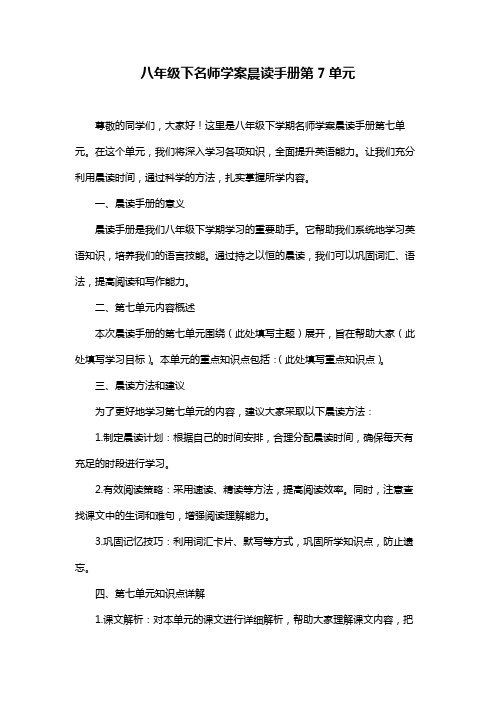
八年级下名师学案晨读手册第7单元尊敬的同学们,大家好!这里是八年级下学期名师学案晨读手册第七单元。
在这个单元,我们将深入学习各项知识,全面提升英语能力。
让我们充分利用晨读时间,通过科学的方法,扎实掌握所学内容。
一、晨读手册的意义晨读手册是我们八年级下学期学习的重要助手。
它帮助我们系统地学习英语知识,培养我们的语言技能。
通过持之以恒的晨读,我们可以巩固词汇、语法,提高阅读和写作能力。
二、第七单元内容概述本次晨读手册的第七单元围绕(此处填写主题)展开,旨在帮助大家(此处填写学习目标)。
本单元的重点知识点包括:(此处填写重点知识点)。
三、晨读方法和建议为了更好地学习第七单元的内容,建议大家采取以下晨读方法:1.制定晨读计划:根据自己的时间安排,合理分配晨读时间,确保每天有充足的时段进行学习。
2.有效阅读策略:采用速读、精读等方法,提高阅读效率。
同时,注意查找课文中的生词和难句,增强阅读理解能力。
3.巩固记忆技巧:利用词汇卡片、默写等方式,巩固所学知识点,防止遗忘。
四、第七单元知识点详解1.课文解析:对本单元的课文进行详细解析,帮助大家理解课文内容,把握文章主旨。
2.语法讲解:针对本单元的语法知识点进行详细讲解,加深同学们对语法规则的理解和运用。
3.词汇拓展:从词汇的用法、搭配等方面进行拓展,丰富大家的词汇量,提高语言表达能力。
五、课后练习与拓展阅读1.习题解析:对本单元的课后习题进行详细解析,帮助同学们掌握所学知识。
2.推荐阅读材料:为大家推荐与本单元主题相关的阅读材料,以拓展视野,提高阅读水平。
六、结语同学们,第七单元的学习要点已经为大家梳理完毕。
希望大家充分利用晨读时间,结合所学方法,扎实掌握本单元的知识点。
同时,养成持续晨读的习惯,不断提高自己的英语水平。
英语晨读口语初中教案
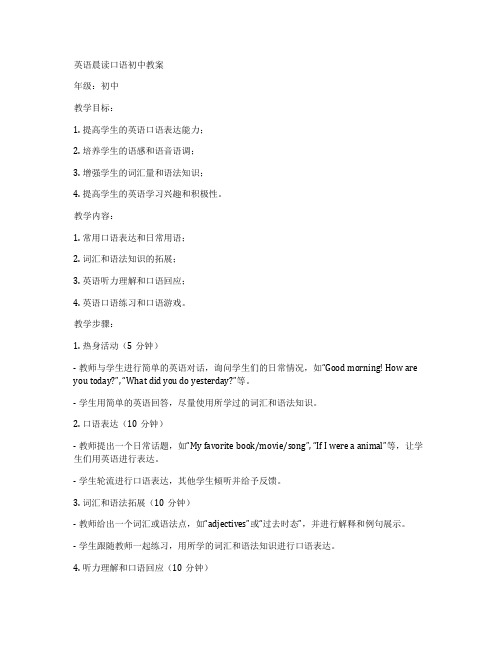
英语晨读口语初中教案年级:初中教学目标:1. 提高学生的英语口语表达能力;2. 培养学生的语感和语音语调;3. 增强学生的词汇量和语法知识;4. 提高学生的英语学习兴趣和积极性。
教学内容:1. 常用口语表达和日常用语;2. 词汇和语法知识的拓展;3. 英语听力理解和口语回应;4. 英语口语练习和口语游戏。
教学步骤:1. 热身活动(5分钟)- 教师与学生进行简单的英语对话,询问学生们的日常情况,如“Good morning! How are you today?”, “What did you do yesterday?”等。
- 学生用简单的英语回答,尽量使用所学过的词汇和语法知识。
2. 口语表达(10分钟)- 教师提出一个日常话题,如“My favorite book/movie/song”, “If I were a animal”等,让学生们用英语进行表达。
- 学生轮流进行口语表达,其他学生倾听并给予反馈。
3. 词汇和语法拓展(10分钟)- 教师给出一个词汇或语法点,如“adjectives”或“过去时态”,并进行解释和例句展示。
- 学生跟随教师一起练习,用所学的词汇和语法知识进行口语表达。
4. 听力理解和口语回应(10分钟)- 教师播放一段英语对话或短文,让学生进行听力理解。
- 教师提问,学生用英语进行口语回应,尽量使用所听到的信息和所学的词汇语法知识。
5. 口语练习和游戏(10分钟)- 教师给出一个口语练习,如模拟对话或角色扮演,学生进行练习。
- 教师组织一个口语游戏,如“快速问答”或“看图说话”,学生参与并展示口语能力。
6. 总结和作业布置(5分钟)- 教师对本节课的内容进行总结,强调重点和难点。
- 布置作业,如口语表达练习或听力练习,让学生巩固所学知识。
教学评价:1. 观察学生在口语表达中的流畅性和准确性;2. 评估学生在听力理解和口语回应中的表现;3. 收集学生作业,检查口语表达的质量和语法正确性;4. 学生自我评价和同伴评价,鼓励学生提出改进意见。
八年级下名师学案晨读手册第7单元
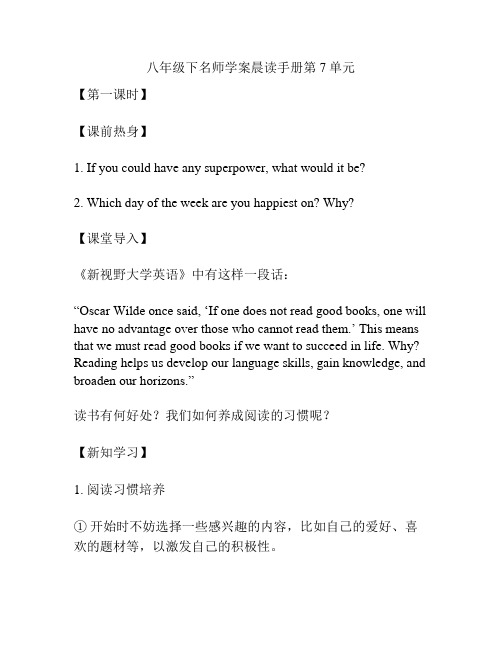
八年级下名师学案晨读手册第7单元【第一课时】【课前热身】1. If you could have any superpower, what would it be?2. Which day of the week are you happiest on? Why?【课堂导入】《新视野大学英语》中有这样一段话:“Oscar Wilde once said, ‘If one does not read good books, one will have no advantage over those who cannot read them.’ This means that we must read good books if we want to succeed in life. Why? Reading helps us develop our language skills, gain knowledge, and broaden our horizons.”读书有何好处?我们如何养成阅读的习惯呢?【新知学习】1. 阅读习惯培养①开始时不妨选择一些感兴趣的内容,比如自己的爱好、喜欢的题材等,以激发自己的积极性。
②在读书的过程中,尽量注意提高自己的阅读质量、效率。
可借助词典、笔记本等辅助工具,来提高自己的阅读技巧。
③逐渐增加阅读的时间和难度。
可以根据自己的实际情况,逐步提高阅读的难度。
④想要养成阅读的好习惯,需要保持一个良好的生活作息和阅读环境。
例如,每天定时、定量地阅读,保持舒适的姿势和环境等。
2. 阅读对于提高英语能力的重要性阅读可以帮助我们:①提高词汇量:在阅读中不仅可以认识新词汇,还可以学习这些词汇的正确使用方法,拓展自己的表达方式。
②了解语言环境:通过阅读,我们可以更好地了解英语国家的文化、历史、经济等方面,进而更好地掌握听说读写各个方面的英语能力。
③培养语感:阅读可以帮助我们更好地把握语言的韵律、语调、语气等方面,进而更好地理解和使用英语。
英语名师测控晨读手册八年级上册

标题:深度解析《英语名师测控晨读手册八年级上册》近年来,随着英语教育的不断发展和改革,各种辅助教材也应运而生。
其中,《英语名师测控晨读手册八年级上册》作为一款备受关注的教辅材料,备受广大学生和教师的喜爱。
本文将从多个角度对其进行全面评估,并结合个人观点,带您深入探究这一主题。
一、晨读手册内容概述1.1. 对晨读手册的定位与目标从晨读手册的定位和目标来看,它不仅是一份日常的朗读材料,更是一份旨在提高学生综合语言素养的教辅资料。
1.2. 晨读手册的主要内容通过对《英语名师测控晨读手册八年级上册》的内容进行逐一解读,我们可以发现,它涵盖了丰富的语言点和实用的英语表达,涉及了阅读、写作、听力以及口语等多个方面。
1.3. 晨读手册的特色与亮点该晨读手册在编排和内容选择上相对系统和全面,注重知识点的渗透性和扩展性,对学生的语言运用能力有很好的促进作用。
二、晨读手册的教学价值分析2.1. 培养学生的自主学习能力晨读手册丰富的内容和难度适中的语言点设计,可以激发学生对英语学习的兴趣,培养他们的自主学习能力。
2.2. 促进学生的语言表达能力通过晨读手册中的词汇、句型、短文等练习,可以有效提高学生的语言表达能力,尤其对口语和写作的提高有明显的促进作用。
2.3. 培养学生的阅读习惯和能力晨读手册中的阅读材料涉及了各种题材和风格,有助于培养学生的阅读习惯和综合阅读能力。
三、对晨读手册的改进建议3.1. 加强语境的渗透性在编写晨读手册内容时,应增加更多真实语境的渗透,使学生更好地融入英语学习环境。
3.2. 强化语言点的延伸性对于一些重要的难点知识,可以通过延伸练习、拓展阅读等方式,加深学生对知识点的理解和运用。
3.3. 注重听力和口语的训练适当增加听力和口语训练的内容,提高学生在实际交流中的应变能力。
四、总结与展望通过对《英语名师测控晨读手册八年级上册》的全面评估,我们不难发现其在教学辅助方面有着显著的优势和特色。
在使用过程中也存在一些可以改进和完善的地方。
初中英语晨读材料讲课稿
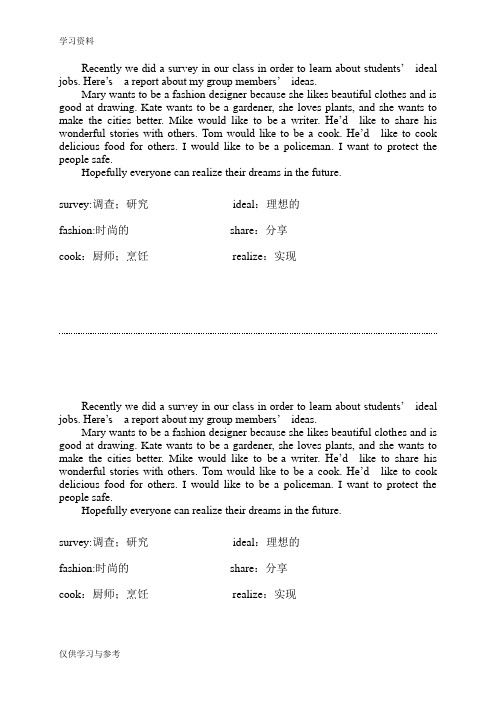
学习资料Recently we did a survey in our class in order to learn about students’ideal jobs. Here’s a report about my group members’ ideas.Mary wants to be a fashion designer because she likes beautiful clothes and is good at drawing. Kate wants to be a gardener, she loves plants, and she wants to make the cities better. Mike would like to be a writer. He’d like to share his wonderful stories with others. Tom would like to be a cook. He’d like to cook delicious food for others. I would like to be a policeman. I want to protect the people safe.Hopefully everyone can realize their dreams in the future.survey:调查;研究ideal:理想的fashion:时尚的share:分享cook:厨师;烹饪realize:实现Recently we did a survey in our class in order to learn about students’ideal jobs. Here’s a report about my group members’ideas.Mary wants to be a fashion designer because she likes beautiful clothes and is good at drawing. Kate wants to be a gardener, she loves plants, and she wants to make the cities better. Mike would like to be a writer. He’d like to share his wonderful stories with others. Tom would like to be a cook. He’d like to cook delicious food for others. I would like to be a policeman. I want to protect the people safe.Hopefully everyone can realize their dreams in the future.survey:调查;研究ideal:理想的fashion:时尚的share:分享cook:厨师;烹饪realize:实现仅供学习与参考。
名校课堂晨读手册八上三单元
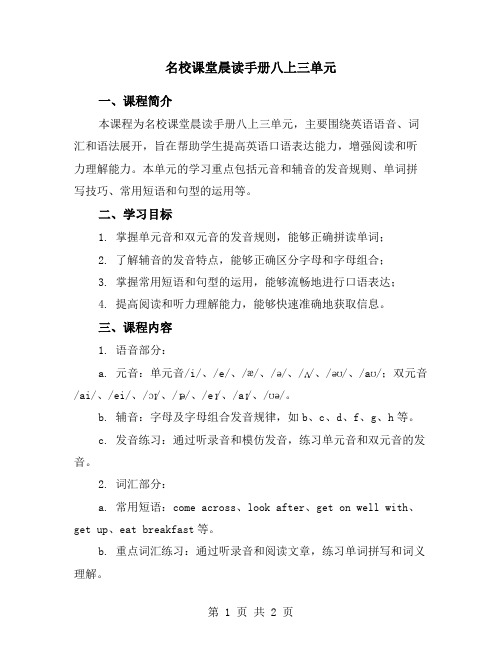
名校课堂晨读手册八上三单元一、课程简介本课程为名校课堂晨读手册八上三单元,主要围绕英语语音、词汇和语法展开,旨在帮助学生提高英语口语表达能力,增强阅读和听力理解能力。
本单元的学习重点包括元音和辅音的发音规则、单词拼写技巧、常用短语和句型的运用等。
二、学习目标1. 掌握单元音和双元音的发音规则,能够正确拼读单词;2. 了解辅音的发音特点,能够正确区分字母和字母组合;3. 掌握常用短语和句型的运用,能够流畅地进行口语表达;4. 提高阅读和听力理解能力,能够快速准确地获取信息。
三、课程内容1. 语音部分:a. 元音:单元音/i/、/e/、/æ/、/ə/、/ʌ/、/əʊ/、/aʊ/;双元音/ai/、/ei/、/ɔɪ/、/ɪə/、/eɪ/、/aɪ/、/ʊə/。
b. 辅音:字母及字母组合发音规律,如b、c、d、f、g、h等。
c. 发音练习:通过听录音和模仿发音,练习单元音和双元音的发音。
2. 词汇部分:a. 常用短语:come across、look after、get on well with、get up、eat breakfast等。
b. 重点词汇练习:通过听录音和阅读文章,练习单词拼写和词义理解。
3. 语法部分:a. 常用句型:there be、what time、where、why等。
b. 时态和语态:一般现在时、现在进行时等。
c. 语法练习:通过完成句子和阅读理解,巩固语法知识。
四、学习方法和建议1. 认真听录音,模仿发音,多加练习;2. 结合实际,运用所学短语和句型进行口语表达;3. 定期复习所学词汇和语法知识,加强记忆;4. 多阅读、多听英语材料,提高阅读和听力理解能力;5. 遇到问题及时向老师或同学请教,不断完善自己的学习方法。
五、课程评估1. 完成单元语音和词汇练习题;2. 参与课堂讨论,运用所学短语和句型进行口语表达;3. 提交一篇与单元主题相关的英语作文;4. 观察学习态度和纪律,综合评价学习表现。
八年级下册英语晨读手册第二单元范文
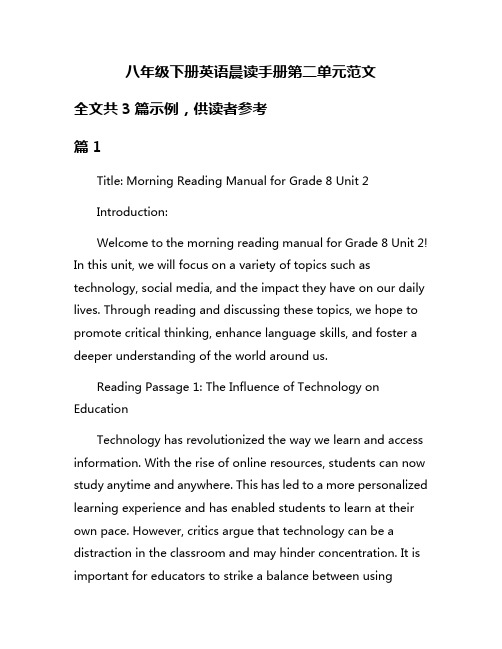
八年级下册英语晨读手册第二单元范文全文共3篇示例,供读者参考篇1Title: Morning Reading Manual for Grade 8 Unit 2Introduction:Welcome to the morning reading manual for Grade 8 Unit 2! In this unit, we will focus on a variety of topics such as technology, social media, and the impact they have on our daily lives. Through reading and discussing these topics, we hope to promote critical thinking, enhance language skills, and foster a deeper understanding of the world around us.Reading Passage 1: The Influence of Technology on EducationTechnology has revolutionized the way we learn and access information. With the rise of online resources, students can now study anytime and anywhere. This has led to a more personalized learning experience and has enabled students to learn at their own pace. However, critics argue that technology can be a distraction in the classroom and may hinder concentration. It is important for educators to strike a balance between usingtechnology as a tool for learning and ensuring that students are engaged and focused.Reading Passage 2: The Role of Social Media in SocietySocial media has become an integral part of our daily lives, allowing us to connect with friends and family, share our thoughts and experiences, and stay informed about current events. However, excessive use of social media has been linked to negative effects such as decreased productivity, poor mental health, and cyberbullying. It is important for individuals to use social media responsibly and to be mindful of its impact on their well-being.Discussion Questions:1. How has technology changed the way we learn in the classroom?2. What are some potential benefits and drawbacks of using social media?3. How can we use technology and social media in a responsible and balanced way?Conclusion:As we navigate the digital age, it is important to be mindful of the impact of technology and social media on our lives. By engaging in discussions, reflecting on the implications of these tools, and making conscious choices about their usage, we can harness their potential for positive change and personal growth. We hope that this morning reading manual has provided you with valuable insights and encouraged you to think critically about the role of technology and social media in the modern world. Thank you for joining us in this journey of discovery and learning!篇2Title: Unit 2 Morning Reading Guide for Grade 8 English TextbookIntroduction:In the second unit of the Grade 8 English textbook, students will delve into various topics focusing on communication and social interactions. This unit will help students enhance their language skills and cultivate a deeper understanding of effective communication in different contexts. The morning reading guide is designed to provide additional practice and support for students to reinforce their learning.Body:The morning reading guide for Unit 2 includes a variety of activities that aim to improve students' reading comprehension, vocabulary, grammar, and writing skills. Each activity is carefully crafted to align with the learning objectives of the unit and help students attain the necessary language proficiency.Reading Comprehension:The reading comprehension activities in the morning reading guide consist of passages on various topics related to communication and social interactions. Students are required to read the passages carefully, understand the main ideas, and answer questions to demonstrate their comprehension skills. These exercises help students develop critical thinking skills and improve their ability to extract information from texts.Vocabulary:Vocabulary exercises in the morning reading guide focus on introducing new words and phrases related to the unit's theme. Students are tasked with learning the meanings of new vocabulary items, using them in sentences, and matching them with their corresponding definitions. These activities helpstudents expand their vocabulary and enhance their language proficiency.Grammar:The grammar exercises in the morning reading guide target specific grammar rules and structures that are relevant to the unit. Students are given practice exercises on tenses, articles, pronouns, and other grammar concepts to reinforce their understanding and application of English grammar rules. These exercises help students improve their writing skills and accuracy in using English grammar.Writing:The writing activities in the morning reading guide encourage students to practice their writing skills by responding to prompts related to the unit's topics. Students are required to write short essays, letters, and dialogues to express their ideas and opinions on communication and social interactions. These writing exercises help students enhance their composition skills and develop their ability to communicate effectively in written English.Conclusion:The morning reading guide for Unit 2 of the Grade 8 English textbook is a valuable resource for students to enhance their language skills and deepen their understanding of effective communication. By engaging in the reading comprehension, vocabulary, grammar, and writing activities provided in the guide, students can improve their proficiency in English and become more confident and competent communicators.篇3The following is a text about the second unit of the morning reading manual for the eighth grade English class:Unit 2: Making PlansDuring this unit, students will engage in activities that focus on making plans for the future. The unit will cover topics such as setting goals, making schedules, and discussing aspirations. Students will have the opportunity to practice their English language skills through reading, writing, and speaking exercises.The first part of the unit will involve discussing personal goals and aspirations. Students will be encouraged to think about what they hope to achieve in the future and how they can work towards accomplishing their goals. This will help them develop their vocabulary related to future plans and ambitions.In the second part of the unit, students will learn how to make schedules and plan their time effectively. They will practice using time-related vocabulary and phrases to discuss daily routines and future plans. Through a series of exercises and activities, students will learn how to prioritize tasks and organize their time efficiently.The final part of the unit will focus on making plans with others. Students will practice making arrangements and discussing future events with friends and family members. They will learn how to use modal verbs like 'will', 'can', and 'might' to make suggestions and propose ideas.Overall, this unit aims to help students improve their English language skills while also teaching them valuable life skills related to goal setting, time management, and effective communication. By the end of the unit, students will be able to confidently discuss their plans for the future and communicate effectively with others about upcoming events and commitments.。
- 1、下载文档前请自行甄别文档内容的完整性,平台不提供额外的编辑、内容补充、找答案等附加服务。
- 2、"仅部分预览"的文档,不可在线预览部分如存在完整性等问题,可反馈申请退款(可完整预览的文档不适用该条件!)。
- 3、如文档侵犯您的权益,请联系客服反馈,我们会尽快为您处理(人工客服工作时间:9:00-18:30)。
八年级英语晨读手册Unit 1 Where did you go on vacation?Unit1 短语1.呆在家里 stay at home2.去爬山 go to the mountains3.去夏令营 go to summer camp4.去度假go on vacation5.相当多 quite a few6.玩的高兴 have a good time\ have fun\ enjoy oneself7.到达 arrive in\ at8.决定做某事 decide to do sth9.去沙滩 go to the beach10.尽力做某事 try to do sth11.一些特别的东西 something special12.在过去 in the past13.享受做某事 enjoy doing sth14.想要做某事 want to do sthe15.开始做某事 start to do\ doing sth16.太多(加可数名词复数)to many17.太多(加不可数名词)to much18.太(形容词、副词)much too19.因为(加单词、短语)because of20.在学校旅行中 on the school trip21.查清楚,弄明白 find out22.如此…..以至于so …. that23.告诉某人去做某事 tell sb to do sth24.保持做某事 keep doing sth25.跳上跳下 jump up and down26.20 分钟后 twenty minutes later\ after twenty minutes27.感觉想要做某事 feeling like doing sth28.最后5小时 the last five hours29.给某人买某物 buy sth for sb\ buy sb sth30.额外两小时、再两小时 another two hours2d conversation:R: Hi, Helen. Long time no see.H: Hi,Rick. Yes, I was on vacation last month.R: Oh, did you go anywhere interesting?H: Yes, I went to Guizhou with my family.R: Wow! Did you see Huangguoshu Waterfall?H: Yes, I did. It was wonderful! We took quite a few photos there. What about you? Did you do anything special last month?R: Not really. I just stayed at home most of the time to read and relax.Unit 1 Grammar focusWhere did you go on vacation? I went to New York City.Did you go out with anyone? No. No one was here. Everyone was on vacation. Did you buy anything special Yes, I bought something for my father./ No, I bought nothing.How was the food? Everything tasted really good.Did everyone have a good time? Oh, yes. Everything was excellent.Unit 2 How often do you exercise?Unit 2重点短语1.多久一次 how often2.多少个小时 how many hours3. 一周一次 once a week4. 一个月两次 twice a month5. 什么类型的舞蹈 what kind of dance6. 熬夜到很晚 stay up late7. 吃一顿健康的早餐 eat a healthy breakfast8. 对…有益,有好处 be good for9. 根本不,一点儿也不not … at all10. 问题的答案 the answer to the question11. 最好的休息方式 the best way to relax12. 帮忙(做)家务 help with housework13. 去购物 go shopping14. 在某人的业余时间in one’s free time15. 询问某人关于某事 ask sb about sth16. 至少 at least17. 使用网络 use the Internet18. 比如,例如 for example19. 和某人共度时光 spend time with sb20. 一个16岁的学生 a 16-year-old student21. 多于,超过 more than22. 许多好习惯 a lot of good habits23. 去看牙医 go to the dentist24. 看电影 go to the movies25. 想要某人做某事 want sb to do sth2d conversation:A:Hi,Claire,are you free next week?B:Hmm… next week is quite full for me,Jack.A:Really? How come?B:I have dance and piano lessons.A:What kind of dance are you learning?B:Oh,swing dance. It’s fun! I have class once a week,every Monday.A:How often do you have piano lessons?B:Twice a week,on Wednesday and Friday.A:Well,how about Tuesday?B:Oh,I have to play tennis with my friends.But do you want to come?A:Sure.Unit 2 Grammar focusWhat do you usually do on weekends? I always exercise.What do they do on weekends? They often help with housework.What does she do on weekends? She sometimes goes shopping.How often do you go to the movies? I go to the movies maybe once a month. How often does he watch TV? He hardly ever watches TV.Do you go shopping? No, I never go shopping.Unit 3 I’m mo re outgoing than my sister.Unit 3 重点短语1 一些新的东西 something new2. 努力工作 work hard3 在某方面有天赋 be talented in4 擅长 be good at\ do well in5 关心,在乎 care about6 使某人做某事 make sb do sth7 喜欢做某事 like doing\ to do8 在课上 in class9 对于某人来说做某事怎么样 It is + adj + for sb + to do sth10 只要 as long as11 和…不同 be different from12 帮某人做某事 help sb to do \ do sth13 使显现 bring out14 和…一样 the same as15 事实上 in fact16 讨论某事 talk about sth17 拿…有办法,善于应付… be good with18 给….打….电话call ….. at19 和…..一样……… as….. as ……20 和….相似2d conversation:A:Did you like the singing competition yesterday,Anna?B:Oh,it was fantastic! Nelly sang so well!A:Well,I think Lisa sang better than Nelly.B:Oh,which one was Lisa?A:The one with shorter hair.I think she sang more clearly than Nelly.B:Yes,but Nelly danced better than Lisa.A:You can tell that Lisa really wanted to win,though.B:Well,everyone wants to win.But the most important thing is to learn something new and have fun.Unit 3 Grammar focusIs Tom smarter than Sam? No, he isn’t. Sam is smarter than Tom.Is Tara more outgoing than Tina? No, she isn’t. Tina is more outgoing than Tara.Are you as friendly as your sister? No, I’m not. I’m friendlier.Does Tara work as hard as Tina? Yes, she does.Who’s more hard-working at school? Tina thinks she works harder than me.Unit 4 What’s the best movie theater?Unit 4重点短语1.the closest to home 离家最近2.so far 到目前为止3.Thanks for telling me. 谢谢你告诉我4.No problem 没问题5.What do you think of ...... 你认为...怎么样6.have ..... in common 有相同特征7.look for 寻找(指动作)8.all kinds of 各种各样9.be up to 由...决定10 play a role 发挥作用,有影响11 made up 编造12 for example 例如(接句子)13 take ..... seriously 认真对待14 come true 实现15 not.... at all 一点也不16 how far 多远17 in town 在城镇18 It has the worst service 它有最糟的服务19 You can buy tickets the most quickly there. 你可以从那最快的买票20 What is the best movie theater to go to 要去的最好的电影院是什么?2d conversation:Greg: Hi, I'm Greg. I'm new in town.Helen: Hi, I'm Helen. Welcome to the neighborhood! How do you like it so far? Greg: It's fantastic, but I still don't really know my way around.Helen: Well, the best supermarket is on Center Street. You can buy the freshest food there.Greg: Oh, great. Is there a cinema around here? I love watching movies.Helen: Yes, Sun Cinema is the newest one. You can sit the most comfortably because they have the biggest seats.Greg: Thanks for telling me.Helen: No problem.Unit 4 Grammar focusWhat’s the best movie theater to go to ?Town Cinema. It’s the closest to home. And you can buy tickets the mos t quickly there?Which is the worst clothes store in town?Dream Clothes. It’s worse than Blue Moon. It has the worst service.What do you think of 970 AM?I think 970 AM is pretty bad. It has worst music.Unit 5 Do you want to watch a game show ?Unit 5重点短语1.你认为…怎么样 What do you think of \ How do you like2.像…. 学习 learn from3.计划做某事 plan to do4.希望做某事 hope to do5.查明,弄清 find out6.继续;发生 go on7.全世界around the world8.讨论….. talk about sth9.期待做某事 expect to do sth10.某一天 one day11.在20 世纪30 年代 in the 1930s12.尽力做某事 try to do13.面对任何困难 face any danger14.例如(加名词、动名词)such as15.准备好做某事 be ready to do16.一双,一对 a pair of17.一种…的象征 a simple of18.出来,出版 come out19.尽某人最大努力try one’s best20.乔装打扮成。
